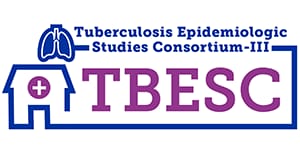Key points
- The Tuberculosis Epidemiologic Studies Consortium (TBESC) is one of CDC’s flagship tuberculosis (TB) research consortia tasked with identifying approaches to accelerate U.S. TB elimination.
- TBESC carries out observational epidemiologic and programmatic research and related studies to improve identification, diagnosis, prevention, and control of TB disease and latent TB infection.

Purpose
TBESC-III (2021-2026)
The current research cycle (TBESC-III) began in September 2021 and will end in March 2026. The purpose of TBESC-III (Implementing and Evaluating Interventions to Increase Treatment of Latent TB Infection in Primary Care Settings) is to assess the following:
- How is latent TB infection screening, testing, and treatment offered to patients in primary care settings?
- What is the impact of primary care interventions designed to increase the number of eligible patients who complete treatment for latent TB infection?
- What is the estimated value to the healthcare system and society of clinical care-based interventions that improve performance measures across the latent TB infection care cascade?
Past TBESC Cycles
TBESC-II (2011-2021)
TBESC-II focused on strategies and tools to increase diagnosis and treatment of latent TB infection in populations at high risk of TB infection or progression to TB disease.
TBESC-I (2001-2011)
TBESC-I focused on programmatically relevant epidemiologic, behavioral, economic, laboratory, and operational research for TB prevention and control.
Goals
TBESC-III objectives include:
- Identify primary care settings that serve non-U.S.–born persons at elevated risk for TB infection.
- Collect retrospective and prospective electronic medical record data.
- Design and implement primary-care–based interventions to improve performance measures across the latent TB infection care cascade.
- Monitor and evaluate intervention performance over time to identify efficient and effective strategies to prevent TB disease.
- Estimate the potential health and economic impacts of TBESC-III clinical care-based interventions.
What we've accomplished
TBESC-II
TBESC-II conducted three main studies (with six sub-studies) evaluating TB blood and skin tests, describing the latent TB infection care cascade, and identifying latent TB infection care cascade gaps, barriers, and facilitators.
TBESC-I
TBESC-I conducted 29 studies on topics ranging from the molecular epidemiology of multidrug-resistant TB disease to the cost of TB disease in urban health departments.
Funded partners
The organizations awarded contracts for TBESC-III are:
- Denver Health and Hospital Authority
- Principal Investigator (PI): Kaylynn Aiona, PhD, MPH;
- Principal Investigator (PI): Kaylynn Aiona, PhD, MPH;
- Public Health – Seattle & King County
- PI: Masa Narita, MD;
- PI: Masa Narita, MD;
- The Regents of the University of California, San Francisco
- PI: Priya Shete, MD, MPH; and
- PI: Priya Shete, MD, MPH; and
- RTI International
- PI: Carolina Barbosa, PharmD, PhD.
- PI: Carolina Barbosa, PharmD, PhD.
